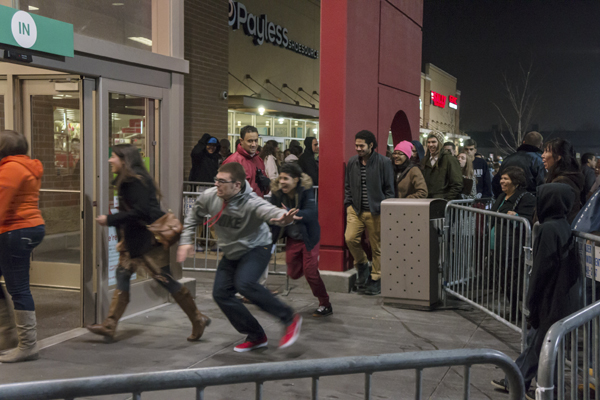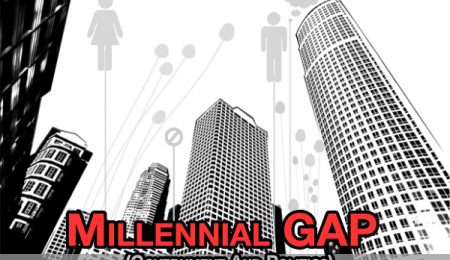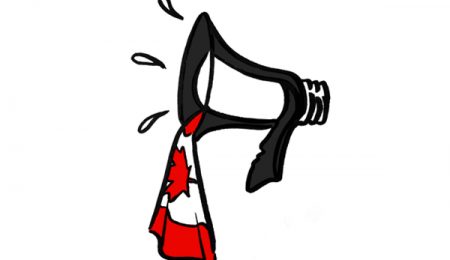Photo: Powhusku CC, flickr.com
In the United States, Black Friday is known as the biggest shopping day of the year, where rock bottom prices on smartphones, flat-screen TVs, and video game consoles draw millions to stores from coast to coast. These crowds generate big returns, with the overall brick-and-mortar sales for last year’s festivities equating to $12.3 billion. While this gives the economy a big boost, Black Friday deals have been known to bring out the worst in people, resulting in fights, riots, and even death. Is this shopping bonanza the epitome of consumer greed, or just a great way to get a head start on holiday shopping?
Black Friday is an offence to human decency
For the most part, I’m not averse to the massive influx of shopping that goes on during the holidays. After all, there’s nothing wrong with people wanting to buy gifts for their loved ones.
However, Black Friday, the official start of the holiday shopping season, always manages to turn my stomach, since it’s the very definition of consumerism gone awry.
By now, virtually everyone knows about the kind of madness and debauchery that goes on the day after American Thanksgiving. YouTube is rife with videos that feature Black Friday shoppers pushing, trampling, and body-checking each other in order to get their hands on cheap electronics. The whole affair resembles that movie The Purge, where people are given one night to loot, riot, and bludgeon each other in a socially acceptable fashion.
Similar to The Purge and other horror movies, Black Friday also boasts an official death count. Since 2006, there have been seven deaths and 90 injuries associated with Black Friday, with fatalities ranging from store employees getting stampeded to two shoppers getting shot in a Toys R Us parking lot.
Forget about the savings—this kind of behaviour does not encourage the growth of a good community or human decency in general.
What’s even worse is that much of this violence is encouraged and initiated by retailers. This is mostly accomplished through the diabolical invention of “door buster” sales, which stipulate that only the first few people into the store are given access to the best discounts of the day. As such, we can see that consumers are being actively manipulated by corporate fat cats to mindlessly consume material goods and kill each other.
The most tragic aspect of Black Friday mayhem is that it’s completely avoidable in the age of the Internet. The same kinds of savings are largely available through the online event Cyber Monday, which pretty much eliminates all the violence and misery.
Thankfully, it looks like people are starting to become wise to this improved method of shopping, since Black Friday crowds have subtly started to decrease, while Cyber Monday sales have grown by 20.6 per cent from 2013.
While we can probably never stop people from being shallow and materialistic, we can at least encourage them to do it in the safety of their own homes—away from sharp objects and stampeding shoppers.
—Kyle Darbyson
Embrace the practical benefits of Black Friday
For many years now, Black Friday has been a staple of American consumerism. Since around 2005, the fourth Thursday in November has been the busiest shopping day in the country.
While some may see the big lines and inevitable tramplings as the pinnacle of consumerist greed and excess, in reality it’s not all bad.
From a practical perspective, Black Friday is actually a great opportunity for lower income families to save money on their holiday purchases. The holiday season tends to be an extra stressful time of year for these families, as many of them have to opt for basic necessities (food, heating) instead of exchanging presents. While those necessities are undoubtedly more important than material goods, Black Friday sales at least give these families an opportunity to provide their loved ones with even the smallest gifts.
These kinds of practical financial benefits also extend to middle-class families. Times are tough all over, and people are looking for any relief they can get. After all, saving tons of money isn’t just some shallow goal trumpeted by shopaholics and materialistic blowhards—it has been linked to improved mental health. According to a study conducted by Claremont Graduate University, receiving discounts makes consumers more relaxed, since the act of using coupons reportedly releases oxytocin, a hormone that’s directly related to love and happiness.
Given the fact that the holiday blues are a real, tangible thing that affect thousands each year, people should take this kind of pick-me-up wherever they can find it.
In terms of the violence that goes on every year, I think it’s easy to say the whole thing is overblown. The media does tend to focus on the negative—magnifying the few instances of violence that occur across the country without acknowledging the thousands of other Black Friday events that go off without a hitch.
Black Friday will always have a bad reputation. Yet every year millions of people participate without fail, and it’s because the practical benefits simply outweigh the negatives.
Moreover, it seems like the first people to complain about Black Friday are also the first ones to complain about how much they had to spend on gifts or how they are “so behind” on their holiday shopping. Stop complaining—just set your alarm and go shopping.
—Spencer Murdock





